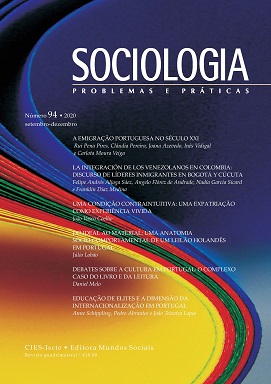A emigração portuguesa no século XXI
DOI:
https://doi.org/10.7458/SPP20209419573Palavras-chave:
emigração portuguesa, migrações intraeuropeias, crise e migrações, indicadores das migraçõesResumo
A emigração portuguesa cresceu nas vésperas do 25 de Abril, regrediu para níveis mínimos depois daquela data, voltou a crescer a partir de meados dos anos 80, acentuou-se no início do novo século, reduziu-se na crise financeira de 2008, atingiu de novo máximos históricos em 2013 e voltou a diminuir, lentamente, desde então. Em termos comparados, Portugal é hoje um país de repulsão migratória, característica que partilha com a maioria dos estados do Leste europeu. Neste artigo, apresentamos a história recente da emigração portuguesa, identificamos os mecanismos e episódios que a explicam e discutimos os problemas metodológicos envolvidos no seu estudo.
Downloads
Publicado
Edição
Secção
Licença
Autores que publicam nesta revista concordam com os seguintes termos:
a. Autores conservam os direitos de autor e concedem à revista o direito de primeira publicação, com o trabalho simultaneamente licenciado sob a Licença Creative Commons Attribution que permite a partilha do trabalho com reconhecimento da autoria e publicação inicial nesta revista.
b. Autores têm autorização para assumir contratos adicionais separadamente, para distribuição não-exclusiva da versão do trabalho publicada nesta revista (ex.: publicar em repositório institucional ou como capítulo de livro), com reconhecimento de autoria e publicação inicial nesta revista.



